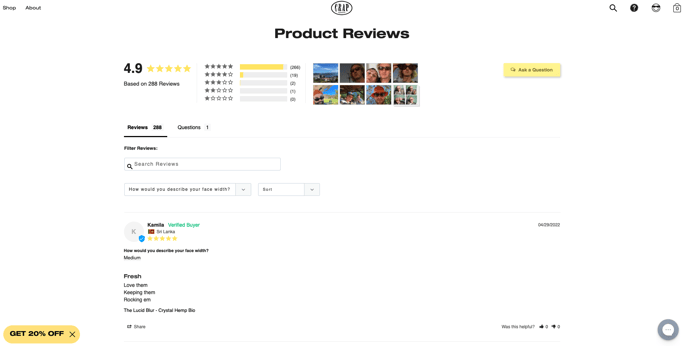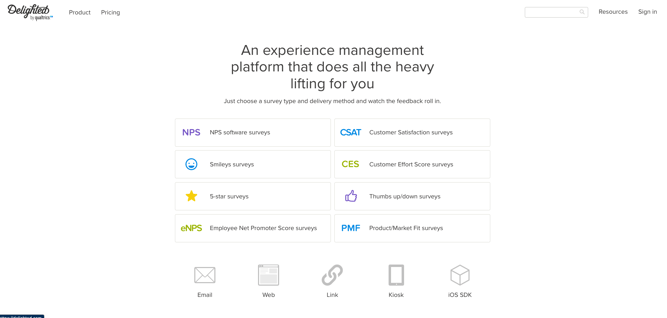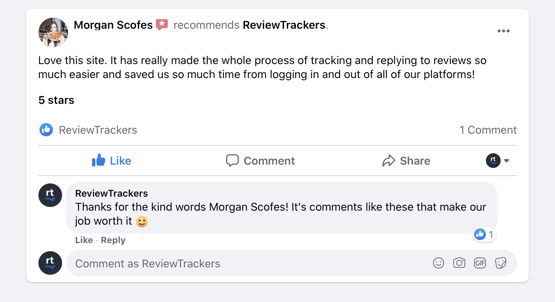Before the world could do business online, when people wanted to make decisions on what to buy, they’d shout across their yard to their neighbours for stories and advice about their own experiences with products or businesses.
Fast-forward to the internet era, and you’re still asking your neighbours about their experiences. Except now, your neighbours are the people of the internet!
Positive customer reviews from happy customers are what helps encourage even more business, and we're pretty keen to help you achieve just that.
So, what's the importance of customer testimonials?
Well, not only does having reviews provide proof of an active and engaged customer base, but it also provides customers with more context on how your service/product will work for them.
The number one tool for sales today is the testimonials or reviews left by other customers. If I'm not mistaken, reviews from customers are essentially what you seek after you've found a new product on Amazon but aren't ready to make the leap of faith.
People tend to trust other people more than a new company that just popped up for them.
Even if you've been around the block, you're new to them. Building trust with prospective customers through positive customer reviews helps build the foundation of a healthy brand that backs its 'marketing words' with actual product satisfaction.
Unfortunately, not all online neighbours are great - some are scams, others are trolls which is why offering a product review option for recently purchased customers pays dividends.
Product reviews allow people to see a broader picture of the product or service and feel more comfortable afterwards, making an informed decision.
How to ask for reviews
Given these factors, you'll want to prioritise getting as many testimonials for your business as possible (positive reviews preferably).
But, just as you put care and consideration into building a fantastic company, the same amount of thought should be given to your strategy for collecting testimonials.
Don't be afraid to understand and communicate with your customers - the more open you are, the more receptive they'll be!
When to ask
You probably won't get anywhere by asking them to write one when the service they wanted wasn't sufficient, so be sure that they have a reason to boast about your product or service. Nobody likes a one-star review.
Do's:
- Do ask customers for reviews after they've had time to experience your services or see value from using your business. When your business has helped a customer solve an issue or they’ve had time to see the positive impact, they may be more likely to share this success with other people. Word of mouth is a hell of a thing!
- Do wait until after the customers have paid for your service, if you offer a free trial. The fact that they’ve continued beyond the free trial stage proves they're probably an invested customer.
Don'ts:
- Don’t ask for testimonials while they're onboarding or haven't spent enough time with your business. Users can’t provide a genuine impression of the business if they haven’t spent enough time with it.
Where to ask
Here are some of the best places to make your request for a review, and places you should avoid. Now that you know when to ask for reviews, you need to figure out where to deliver the message.
This might sound like a taxing ordeal to get customers to write a review about your product or service, but it really isn't. There are a couple ways we're going to share with grabbing a customer review.
Do's:
- If it isn't intrusive and makes sense, include a pop up for a section of your site. Perhaps having a dedicated section to customer experiences that's easily accessible?

- Do leverage your loyal customers, or those that have an interest in your brand that have opted into your email newsletters! This could get potential customers over the line if they're part of your database already.
- Do send an email after a customer support resolution. This doesn't just get a view on your product or service, but also your customer service. A bad experience can quickly turn into a pleasurable one if you can deliver a solution to customer concerns.
Don'ts:
- Don’t be intrusive or send unsolicited emails. Keep it simple for the customer.
Give to receive
I mean a free discount never hurt anyone, right? A great way to incentivise your customers is by offering them a percentage off, or even a coupon to give them a lil' nudge on offering up a sentence or two on their experience with you.
No... you're not bribing your customers but you are giving them a reason to give up their time. Realistically, you not taking anything from the top from a couple of sales in exchange for customer reviews encourages future buying decisions that are in your favour.
Be authentic with your customers
You might not be able to afford to give your customers anything in return for their review - especially if you're a small to new business. You'll want to have an email that captures their attention and gets them to want to help you.
Make sure your email headline is one that stands out above the rest and that the message you are giving to them is one that will resonate with your customer. Something authentic that feels like a real person on the other end.
Let them know that their business has helped you to achieve a goal or make your dreams a success of what you envisioned your company would be. Perhaps a little cliche, but being true to what they've helped you achieve is our advice.
Positive reinforcement yields positive results. You have to give something positive to receive something positive in return. As I have mentioned before, these people aren't shareholders, but they are in a sense. If customers make the buying process and the product more trustworthy to new customers, then they have just as much stake in your success as anybody else.
Treat them like they are a part of your company and that they are a big part of the reason for your success.
Video or audio testimonials
You can go as far as asking your clients or your customers for an interview about their experience. Though it definitely requires more of their time, an interview on video or audio would be great for your business, as long as it isn't obvious that they are being paid for their time. You'll likely have to cough up something in return for their time but don't let this be the basis of them 'having' to provide a good review. Let them provide honest feedback.
Payment for an interview should be paid for their time, not for rehearsing a script that you came up with for them. You don't want it to come out that it wasn't genuine or your goal of seeming more trustworthy will be viewed as a failure. Asking questions like, "what was the best thing about your experience" is a good way to highlight your product or service features that stand out to an existing customer.
This is where having a solid foundation of a good customer relationship from nurturing communication comes in handy. It encourages repeat business whilst offering opportunities for your customers to become more involved in later ventures.
Software tools available to request testimonials
There are a couple of paid tools out there worth mentioning that focus on helping you collect testimonials from your customers...
- VideoAsk, VideoPeel, VocalVideo, to name a few that, are focused on collecting video testimonials from your customers.
- Delighted by Qualtrics is one where they help you turn positive customer feedback into web-ready social proof with testimonials.

Some common features to look out for while evaluating these software tools are:
A template library: They usually have templates that help you get started quickly. Just modify them to match your business.
Analytics: You need to be able to understand how your videos are performing on different platforms.
Reminders: Customisable reminders that can be sent to your customers at the right time to request feedback and reviews.
Video creation and publishing tools: A tool that takes care of the entire process of video editing. This should be easy for you and your customers to use, though don't give them the steering wheel for editing. Make this is as easy as possible for them to offer a positive experience.
These are examples of video testimonial software, which is an automated way to capture your customer testimonials. These send a record link to the customer. The customer will visit the custom link and record the testimonial video in their own time.
Social media is your friend here
Social proof is super important. A lot of people visit company pages on these social media sites to explore the company and gain additional information. People are communicating with each other and with companies on social media on a regular basis. You can ask for testimonials right there on social media.

Communicating with people on your social media page will create a great deal of trust in your products and yourself.
A customer testimony would be easy to get on a social media platform because people have this urge to connect, read others' testimonies, and see if their experiences were similar or vastly different.
Make testimonials visible on your webpage.
We all want to be with a trustworthy business, so having an area on your webpage with testimonials will help your company seem more trustworthy to others to feel comfortable using it. 

